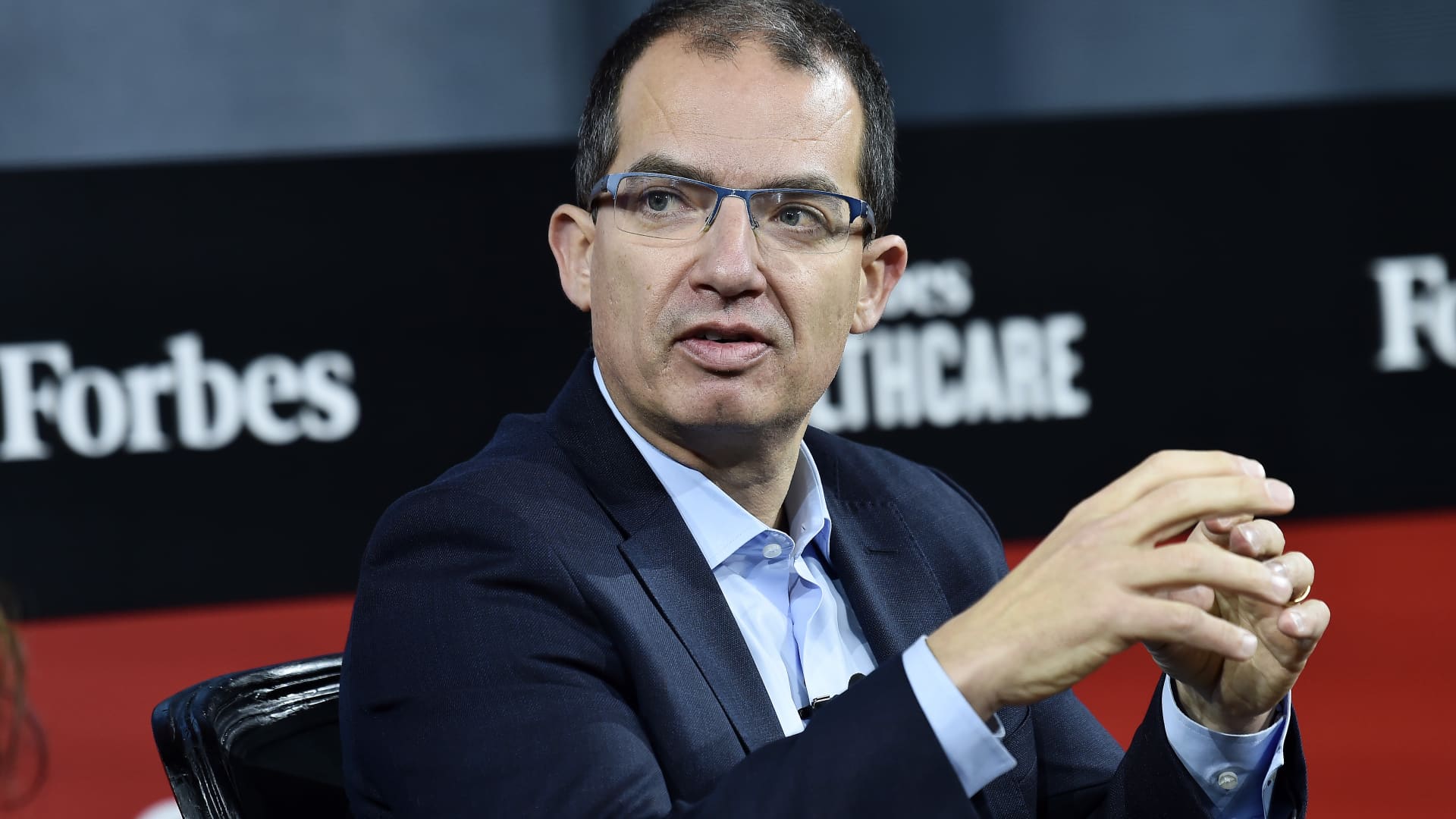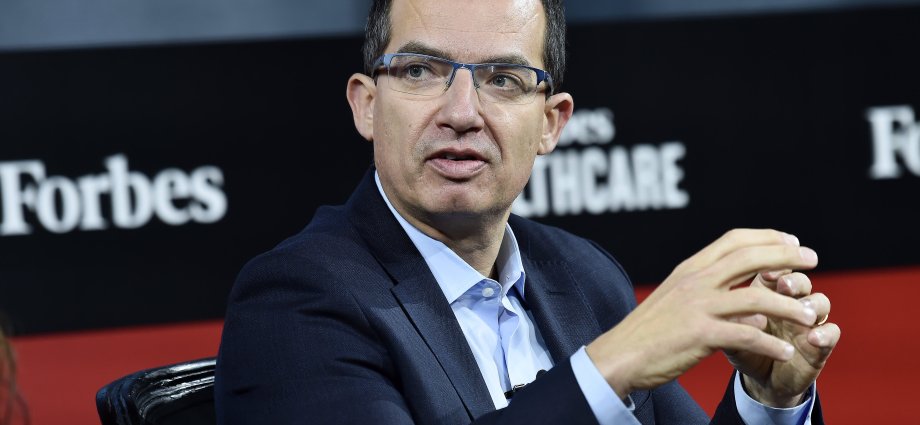
Moderna CEO Stephane Bancel
Steven Ferdman | Getty Images
Moderna CEO Stephane Bancel has sold $408 million in company stock since the beginning of the pandemic — averaging roughly $3.6 million a week — as the company’s stock soared on the development and rollout of its Covid vaccine, according to CNBC’s analysis of the company’s securities filings.
The Cambridge, Massachusetts biotech company and its French CEO weren’t widely known outside biotech circles prior to the pandemic. However, they both became breakthrough success stories as Moderna rapidly developed its two-dose Covid vaccine in cooperation with the National Institutes of Health and with taxpayer backing trough Operation Warp Speed.
Moderna’s shots are now the second most commonly used Covid vaccine in the U.S. after Pfizer, with more than 209 million doses administered, according to the Centers for Disease Control and Prevention.
Courtney Yu, director of research at Equilar, said the value of Bancel’s sales speak to how well the company’s has stock has performed on the success of its vaccine. Equilar, which provides data on executive compensation, independently verified the value of Bancel’s sales.
Moderna’s stock has soared 614% since first announcing on Jan. 23, 2020 that it received funding from the Coalition for Epidemic Preparedness Innovations to develop a coronavirus vaccine. The FDA granted emergency authorization for Moderna’s vaccine in December 2020.
Moderna’s Covid vaccine remains the biotech company’s only commercially available product. The shots have made Bancel a billionaire with an estimated net worth of more than $5.3 billion in company equity alone — based on his reported holdings as of March 1 and Wednesday’s closing price — and created a windfall for investors. The 12-year-old company, which went public in December 2018, booked its first profit last year — $12.2 billion — on $17.7 billion in Covid vaccine sales. It’s projecting a minimum of $19 billion in sales of its signature shots this year.
The $408 million Bancel cashed out since January 2020 was done through so-called 10b5-1 stock plans adopted before the pandemic in 2018. These plans allow executives to sell a pre-determined number of shares, executed by a broker, at regular intervals to avoid the possibility of insider trading. The Securities and Exchange Commission adopted the 10b5-1 rule more than 20 years ago to give executives a way to cash in some of their shares without facing allegations of insider trading and potential legal action.
Moderna’s executives are required to trade under 10b5-1 plans, in which shares are sold during an open trading window under the company’s insider trading policy, according to Moderna’s 2022 proxy report.
“It’s meant to be sort of a safe harbor against being sued,” said David Larcker, a professor of accounting at the Stanford Graduate School of Business, who has researched 10b5-1 plans.
Altogether, Bancel has sold more than 2.8 million shares since late January 2020 under the trading plans adopted before the pandemic. From Moderna’s IPO until the announcement of CEPI funding for the vaccine, he sold approximately $3.2 million in shares.
The SEC has few rules governing 10b5-1 plans, other than the requirement that they cannot be adopted or amended while in possession of material nonpublic information. Because there are so few rules, the plans are flexible and vary across companies.
“Currently SEC rules are quite lax around the plans,” said Daniel Taylor, a professor of accounting at the Wharton School. Taylor said although some companies, such as Moderna, require executives to trade under 10b5-1 plans as form of “good corporate hygiene,” other companies leave it up to the discretion of the executive whether they adopt such a plan.
Though 10b5-1 plans are supposed to prevent insider trading, they are controversial due to their lack of transparency. Companies whose executives trade under 10b5-1 plans are not required to make any disclosures to the SEC about the content of such plans.
Moderna declined to comment on whether it would publicly disclose the details of Bancel’s 10b5-1 plans, though his stock sale filings do provide the dates his trading plans were adopted, all in December 2018 with amendments made in September 2019 and May 2020. Moderna said Bancel’s 10b5-1 trading program was last amended in May 2021 to increase his charitable giving. Bancel has donated hundreds of thousands of shares to charity.
“There is no required disclosure for 10b5-1 plans of any sort,” Taylor said.
Bancel typically sells 19,000 shares about every week under his 10b5-1 plans, averaging roughly $3.6 million every seven days, according to CNBC’s analysis of the company’s securities filings. The shares are usually sold in two tranches, 9,000 directly owned by Bancel and 10,000 indirectly owned through a limited liability corporation called OCHA. Bancel has sold around 861,000 shares he directly owns at a total value of approximately $153 million since late January 2020.
Bancel is the majority equity holder and sole managing member of OCHA, according to the SEC filings. He has sold about 972,000 Moderna shares indirectly owned through OCHA at a total value of approximately $170 million since late January 2020. OCHA is an investment company, according to corporate filings in Massachusetts where it has a branch.
OCHA is registered in Delaware, which does not require companies to disclose the nature of their business upon formation and registration with the state. Bancel declined to provide any more details on the company through a spokeswoman at Moderna.
Bancel has also sold more than 191,000 shares that he owns indirectly through Boston Biotech Ventures for a total value of about $13 million since January 2020. Boston Biotech Ventures is a limited liability company that provides angel investing to start-ups in the Boston area and files patents to start new companies, according to corporate filings in Massachusetts. Bancel is the majority equity holder and sole managing member of Boston Biotech Ventures, according to SEC filings.
Bancel also has an independent trust fund for his children, which has sold about 752,000 Moderna shares for a total value of approximately $67 million since late January 2020.
In February 2021, Democratic Sens. Elizabeth Warren of Massachusetts, Chris Van Hollen of Maryland, and Sherrod Brown of Ohio called on the SEC reform the 10b5-1 rule to provide greater transparency. Last December, the SEC proposed a several changes such as requiring companies to disclose in their quarterly reports the adoption or termination of 10b5-1 plans and the terms of the stock trading arrangements. Those changes have not yet been adopted.
“The reason people are so interested is because there’s this lack of transparency that is mandated by the SEC,” Taylor said. “If [Bancel] had disclosed the plan in 2018, would we really be so interested in his stuff? I think the answer is probably no.”











